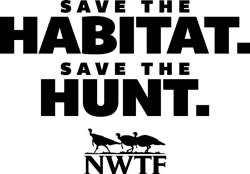Kansas NWTF Budgets $81,410 for State Conservation Projects
National Wild Turkey Federation 09.02.14

The Kansas State Chapter of the National Wild Turkey Federation (NWTF) recently allocated $81,410 for state Save the Habitat. Save the Hunt. programs in 2015.
“The state level support of the Save the Habitat. Save the Hunt. initiative is tremendous,” said Becky Humphries, NWTF executive vice president of conservation. “The projects outlined in the state’s proposals exemplify what we look for when allocating Super Fund dollars.”
More than $765,000 in matching funds also will come from conservation partners; nearly a 12-to-1 match on NWTF funds.
The NWTF Save the Habitat. Save the Hunt. initiative is a charge that mobilizes science, fundraising and devoted volunteers to give the NWTF more energy and purpose than ever. Through this national initiative, NWTF has committed to raising $1.2 billion to conserve and enhance more than 4 million acres of essential upland wildlife habitat, create at least 1.5 million hunters and open access to 500,000 acres for hunting, shooting and outdoor enjoyment. Without hunters, there will be no wildlife or habitat. The NWTF is determined to Save the Habitat. Save the Hunt.
Education and outreach funding totals $36,030 and will support JAKES, Women in the Outdoors, Wheelin’ Sportsmen, scholarships, education boxes for schools and hunter access programs.
The board of directors allocated the remaining $45,380 for habitat projects to address immediate focal landscape needs identified by NWTF wildlife biologists. Projects include:
- $5,000 for continued support of NWTF Regional Biologist Program. Partners: Kansas and Nebraska NWTF State Chapters, Nebraska Game and Parks Commission, Kansas Department of Wildlife, Parks and Tourism (KDWPT)
- $1,000 to support NWTF’s October Forestry Workshop for Resource Professionals. Partners: KDWPT and Kansas Forest Service (KFS)
- $6,950 to purchase habitat management equipment for KDWPT Region 1 and pumping units for Fort Riley’s Prescribed Burning Program. Partners: KDWPT and Fort Riley Conservation Department
- $10,430 to support KDWPT grassland restoration efforts at Clinton, Glen Elder, Norton and Cedar Bluff Wildlife Areas. Partners: KDWPT, Pheasants Forever and Quail forever
- $12,000 to support forest stand improvement at KDWPT’s Hollister Wildlife Area and an oak regeneration/research project at Kansas State University’s (KSU) Howe property. Partners: KDWPT, KFS and KSU Horticulture, Forestry and Recreational Resources Department
- $10,000 to support restoration of water corridors on KDWPT’s Cedar Bluff and Melvern Wildlife Areas and U.S. Forest Service (USFS) on Cimarron National Grasslands. Partners: KDWPT and USFS
To learn more about the NWTF Save the Habitat. Save the Hunt. initiative, visit www.nwtf.org.
Contact:
Peter Muller at (803) 637-7698

